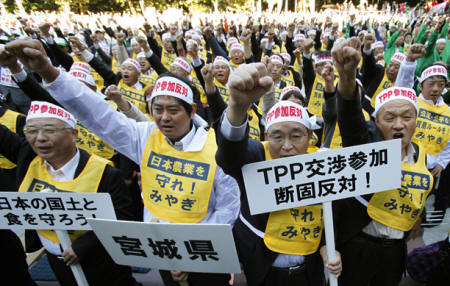|
from TheNation Website
which would grant enormous new powers to corporations,
is a massive assault on democracy.
along with other farmers from across Japan during a rally against Japan participating in rule-making negotiations for the U.S.-led Trans-Pacific Partnership (TPP) in Tokyo October 26, 2011.
REUTERS/Yuriko Nakao
The mechanism is the Trans-Pacific Partnership.
Negotiations have been conducted in extreme
secrecy, so you are in good company if you have never heard of it. But the
thirteenth round of negotiations between the United States and eight Pacific
Rim nations will be held in San Diego in early July.
The Obama administration initially paused the
talks, ostensibly to develop a new approach compatible with candidate
Obama’s pledges to replace the old NAFTA-based trade model. But by late
2009, talks restarted just where Bush had left off.
In June a text of the TPP investment chapter was
leaked, revealing that US negotiators are even pushing to expand NAFTA’s
notorious corporate tribunals, which have been used to attack domestic
public interest laws.
They include new investor safeguards to ease job
offshoring and assert control over natural resources, and severely
limit the regulation of financial services, land use, food safety, natural
resources, energy, tobacco, healthcare and more.
In May US Trade Representative Ron Kirk said he “would love nothing more” than to have China join.
In June Mexico and Canada entered the process,
creating a NAFTA on steroids, with most of Asia to boot.
The proposed pact would limit even how governments can spend their tax dollars. Buy America and other Buy Local procurement preferences that invest in the US economy would be banned, and “sweat-free,” human rights or environmental conditions on government contracts could be challenged.
If the TPP comes to fruition, its retrograde
rules could be altered only if all countries agreed, regardless of domestic
election outcomes or changes in public opinion. And unlike much domestic
legislation, the TPP would have no expiration date.
Called Investor-State Dispute Resolution, it empowers corporations to sue governments - outside their domestic court systems - over any action the corporations believe undermines their expected future profits or rights under the pact. Three-person international tribunals of attorneys from the private sector would hear these cases.
The lawyers rotate between serving as “judges” -
empowered to order governments to pay corporations unlimited amounts in
fines - and representing the corporations that use this system to raid
government treasuries. The NAFTA version of this scheme has forced
governments to pay more than $350 million to corporations after suits
against toxic bans, land-use policies, forestry rules and more.
But trade is the least of it.
The United States already has free-trade agreements that eliminated tariffs with most TPP countries, which highlights the fact that the TPP is mainly about new corporate rights, not trade. Besides, under past free-trade agreements, US export growth to partner countries is half as much as to countries with which we do not have such agreements.
Since NAFTA and similar pacts went into effect,
the United States has been slammed by a massive trade deficit, which has
cost more than 5 million jobs and led to the loss of more than 50,000
manufacturing plants.
In 2010 TPP countries agreed not to release negotiating texts until four years after a deal was done or abandoned. Even the World Trade Organization, hardly a paragon of transparency, releases draft negotiating texts. This means that although the TPP could rewrite vast swaths of domestic policy affecting every aspect of our lives, the public, press and Congress are locked out.
Astoundingly, Senator Ron Wyden, chair of the Senate committee with official jurisdiction over TPP, has been denied access even to US proposals to the negotiations. But 600 corporate representatives serving as official US trade advisers have full access to TPP texts and a special role in negotiations.
When challenged about the conflict with the Obama administration’s touted commitment to transparency, Trade Representative Kirk noted that after the release of the Free Trade Area of the Americas (FTAA) text in 2001, that deal could not be completed.
In other words, the official in charge of the
TPP says the only way to complete the deal is to keep it secret from the
people who would have to live with the results.
Thankfully, opposition by some countries to the most extreme corporate demands has slowed negotiations. Australia has announced it will not submit to the parallel corporate court system, and it and New Zealand have rejected a US proposal to allow pharmaceutical companies to challenge their government medicine formularies’ pricing decisions, which have managed to keep their drug costs much lower than in the United States.
Every country has rejected the US proposal to extend drug patent monopolies.
This text was leaked, allowing government health
officials and activists in all the countries to fight back. Many countries
have also rejected a US proposal that would forbid countries from using
capital controls, taxes or other macro-prudential measures to limit the
destructive power of financial speculators.
The Doha Round of WTO expansion, the FTAA and other corporate attacks via “trade” agreements were successfully derailed when citizens around the world took action to hold their governments accountable.
Certainly in an election year, we are well
poised to turn around the TPP as well.
|

